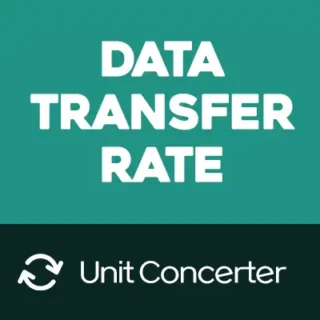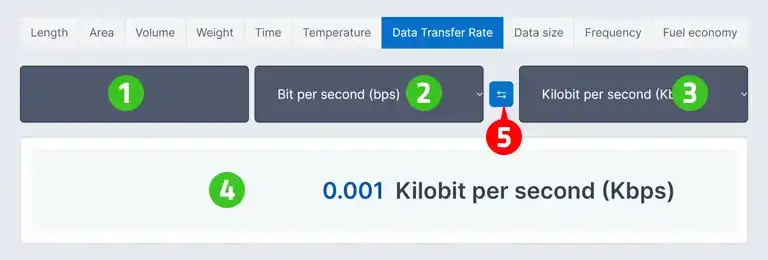Table Of Contents
Data Transfer Rate Converter?
A data transfer rate unit converter is a tool that can convert various data transfer rate units into each other. It accurately calculates and converts units such as bits per second (bps), kilobits per second (Kbps), kibibits per second (Kibps), megabits per second (Mbps), mebibits per second (Mibps), gigabits per second (Gbps), gibibits per second (Gibps), terabits per second (Tbps), tebibits per second (Tibps), bytes per second (Bps), kilobytes per second (KBps), kibibytes per second (KiBps), megabytes per second (MBps), mebibytes per second (MiBps), gigabytes per second (GBps), gibibytes per second (GiBps), terabytes per second (TBps), and tebibytes per second (TiBps).
Explanation of Data Transfer Rate
Bits per second (bps) : The number of bits transmitted per second, the most basic unit of data transfer rate.
Kilobits per second (Kbps) : 1 Kbps equals 1,000 bits per second. Commonly used to measure internet speed or data transfer rate.
Kibibits per second (Kibps) : 1 Kibps equals 1,024 bits per second. Uses binary prefixes for more precise data transfer speed representation.
Megabits per second (Mbps) : 1 Mbps equals 1,000,000 bits per second. Used to indicate high-speed internet connections or network performance.
Mebibits per second (Mibps) : 1 Mibps equals 1,048,576 bits per second. Uses binary prefixes for more precise high-speed data transfer speed representation.
Gigabits per second (Gbps) : 1 Gbps equals 1,000,000,000 bits per second. Used to indicate very fast internet connections or large data transfer speeds.
Gibibits per second (Gibps) : 1 Gibps equals 1,073,741,824 bits per second. Uses binary prefixes for more precise very fast data transfer speed representation.
Terabits per second (Tbps) : 1 Tbps equals 1,000,000,000,000 bits per second. Used for ultra-fast data transfers or large-scale network connections.
Tebibits per second (Tibps) : 1 Tibps equals 1,099,511,627,776 bits per second. Uses binary prefixes for more precise ultra-fast data transfer speed representation.
Bytes per second (Bps) : 1 Bps equals 8 bits per second. Used to represent data transfer speed in bytes.
Kilobytes per second (KBps) : 1 KBps equals 1,000 bytes per second. Commonly used to indicate file download speeds or data transfer rates.
Kibibytes per second (KiBps) : 1 KiBps equals 1,024 bytes per second. Uses binary prefixes for more precise data transfer speed representation.
Megabytes per second (MBps) : 1 MBps equals 1,000,000 bytes per second. Used to indicate high-speed data transfer rates or large file transfer speeds.
Mebibytes per second (MiBps) : 1 MiBps equals 1,048,576 bytes per second. Uses binary prefixes for more precise high-speed data transfer speed representation.
Gigabytes per second (GBps) : 1 GBps equals 1,000,000,000 bytes per second. Used to indicate very fast data transfer rates or large-scale data transfers.
Gibibytes per second (GiBps) : 1 GiBps equals 1,073,741,824 bytes per second. Uses binary prefixes for more precise very fast data transfer speed representation.
Terabytes per second (TBps) : 1 TBps equals 1,000,000,000,000 bytes per second. Used for ultra-fast data transfers or large-scale data processing speeds.
Tebibytes per second (TiBps) : 1 TiBps equals 1,099,511,627,776 bytes per second. Uses binary prefixes for more precise ultra-fast data transfer speed representation.
Data Transfer Rate Conversion Formula
How to Use the Data Transfer Rate Converter
When you first open the page, the default unit is set to 1 bit per second (bps), and the converted values for all data transfer rate units are displayed. If you need a different unit value, follow the steps below.
- Enter the value of the data transfer rate you want to convert in the first input field.
- Select the data transfer rate from the second drop-down menu.
- Choose the target unit for conversion from the third drop-down menu.
- Check the result in the fourth section.
- Press the fifth button to swap the data transfer rate and see the converted result.
FAQ
How do I use the data transfer rate converter?
Enter the value of the data transfer rate you want to convert, select the “source unit” and the “target unit” you want to convert to. The calculation is done automatically without the need to click any buttons. The result is displayed immediately below. If you want to see the results in all units, select “all units” for the “target unit,” and all converted values will be displayed at once.
What units are supported?
Our site supports the conversion of various data transfer rate including bits per second (bps), kilobits per second (Kbps), kibibits per second (Kibps), megabits per second (Mbps), mebibits per second (Mibps), gigabits per second (Gbps), gibibits per second (Gibps), terabits per second (Tbps), tebibits per second (Tibps), bytes per second (Bps), kilobytes per second (KBps), kibibytes per second (KiBps), megabytes per second (MBps), mebibytes per second (MiBps), gigabytes per second (GBps), gibibytes per second (GiBps), terabytes per second (TBps), and tebibytes per second (TiBps).
Are there any restrictions on usage?
The data transfer rate converter on this page is provided for free and can be used without any restrictions.
Can it be used on mobile devices?
Yes, it works very well. You can easily and quickly apply data transfer rate conversions on smartphones in the same way as on a PC.
How accurate is it?
It is highly accurate. Although there might be slight discrepancies due to the large differences in unit values and very long decimal places, it uses international standard units and conversion formulas, so it can be used without any issues.
How fast is the data transfer rate conversion?
When you input a number in the blank field, it calculates almost in real-time, reflecting the result quickly and accurately.
Can it be used offline?
The data transfer rate converter provided on this page requires an internet connection. For offline use, you can either manually calculate using the formulas provided in the text or use the “Right-click – Save As” option.



